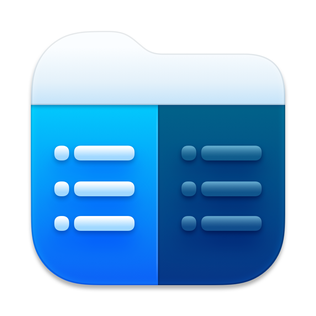
Gmail is the email service provided by Google. As of 2019, it had 1.5 billion active users worldwide, making it the largest email service in the world. It also provides a webmail interface, accessible through a web browser, and is also accessible through the official mobile application. Google also supports the use of third-party email clients via the POP and IMAP protocols.
A file-hosting service, also known as cloud-storage service, online file-storage provider, or cyberlocker, is an internet hosting service specifically designed to host user files. These services allow users to upload files that can be accessed over the internet after providing a username and password or other authentication. Typically, file hosting services allow HTTP access, and in some cases, FTP access. Other related services include content-displaying hosting services, virtual storage, and remote backup solutions.

SugarSync is a cloud service that enables active synchronization of files across computers and other devices for file backup, access, syncing, and sharing from a variety of operating systems, such as Android, iOS, Mac OS X, and Windows devices. For Linux, only a discontinued unofficial third-party client is available.
Google Workspace is a collection of cloud computing, productivity and collaboration tools, software and products developed and marketed by Google. It consists of Gmail, Contacts, Calendar, Meet and Chat for communication; Drive for storage; and the Google Docs Editors suite for content creation. An Admin Panel is provided for managing users and services. Depending on edition Google Workspace may also include the digital interactive whiteboard Jamboard and an option to purchase add-ons such as the telephony service Voice.

Microsoft OneDrive is a file-hosting service operated by Microsoft. First released in August 2007, it allows registered users to store, share and sync their files. OneDrive also works as the storage backend of the web version of Microsoft 365 / Office. OneDrive offers 5 GB of storage space free of charge, with 100 GB, 1 TB, and 6 TB storage options available either separately or with Microsoft 365 subscriptions.

MediaFire is a file hosting, file synchronization, and cloud storage service based in Shenandoah, Texas, United States. Founded in June 2006 by Derek Labian and Tom Langridge, the company provides client software for Microsoft Windows, macOS, Linux, Android, iOS, BlackBerry 10, and web browsers. MediaFire has 43 million registered users and attracted 1.3 billion unique visitors to its domains in 2012.
This is a comparison of online backup services.
Dropbox is a file hosting service operated by the American company Dropbox, Inc., headquartered in San Francisco, California, U.S. that offers cloud storage, file synchronization, personal cloud, and client software. Dropbox was founded in 2007 by MIT students Drew Houston and Arash Ferdowsi as a startup company, with initial funding from seed accelerator Y Combinator.

Ubuntu One is an OpenID-based single sign-on service operated by Canonical Ltd. to allow users to log onto many Canonical-owned Web sites. Until April 2014, Ubuntu One was also a file hosting service and music store that allowed users to store data "in the cloud".

ZumoDrive is a defunct cloud-based file hosting service operated by Zecter, Inc. On December 22, 2010, Zecter announced its acquisition by Motorola Mobility. The service enabled users to store and sync files online, and also between computers using their HybridCloud storage solution; the latter functionality stopped working in approximately September 2011, while the former was undergoing formal takedown on May 1, 2012. ZumoDrive had a cross-platform client that enabled users to copy any file or folder into the ZumoDrive virtual disk that was then synced to the web and the users' other computers and hand-held devices. Files in the ZumoDrive virtual disk could be shared with other ZumoDrive users or accessed from the web. Users could also upload files manually through a web browser interface. A free ZumoDrive account offered 2 GB of storage, and users could upgrade to paid plans ranging from 10 GB to 500 GB for a monthly subscription fee. The ZumoDrive service was integrated into Yahoo! Mail, allowing users to send or receive any file on their ZumoDrive, and powers HP's recent CloudDrive technology, bundled on all new HP Mini netbooks.

Style Jukebox was a hi-fi high-resolution audio cloud music streaming and storage player for the Windows, iOS, Android and Windows Phone platforms. A Web Player was also available for Mac, Windows and Linux.

iCloud is a cloud service operated by Apple Inc. Launched on October 12, 2011, iCloud enables users to store and sync data across devices, including Apple Mail, Apple Calendar, Apple Photos, Apple Notes, contacts, settings, backups, and files, to collaborate with other users, and track assets through Find My. It is built into iOS, iPadOS, watchOS, tvOS, macOS, and visionOS. iCloud may additionally be accessed through a limited web interface and Windows application.

WhatsApp is an instant messaging (IM) and voice-over-IP (VoIP) service owned by technology conglomerate Meta. It allows users to send text, voice messages and video messages, make voice and video calls, and share images, documents, user locations, and other content. WhatsApp's client application runs on mobile devices, and can be accessed from computers. The service requires a cellular mobile telephone number to sign up. In January 2018, WhatsApp released a standalone business app called WhatsApp Business which can communicate with the standard WhatsApp client.
Google Drive is a file-hosting service and synchronization service developed by Google. Launched on April 24, 2012, Google Drive allows users to store files in the cloud, synchronize files across devices, and share files. In addition to a web interface, Google Drive offers apps with offline capabilities for Windows and macOS computers, and Android and iOS smartphones and tablets. Google Drive encompasses Google Docs, Google Sheets, and Google Slides, which are a part of the Google Docs Editors office suite that allows collaborative editing of documents, spreadsheets, presentations, drawings, forms, and more. Files created and edited through the Google Docs suite are saved in Google Drive.
Convergent encryption, also known as content hash keying, is a cryptosystem that produces identical ciphertext from identical plaintext files. This has applications in cloud computing to remove duplicate files from storage without the provider having access to the encryption keys. The combination of deduplication and convergent encryption was described in a backup system patent filed by Stac Electronics in 1995. This combination has been used by Farsite, Permabit, Freenet, MojoNation, GNUnet, flud, and the Tahoe Least-Authority File Store.

IDrive Inc. is a technology company that specializes in data backup applications. Its flagship product is IDrive, an online backup service available to Windows, Mac, Linux, iOS and Android users.

Commander One is a dual-pane file manager designed for macOS. Developed by Electronic Team, Inc., the software is created entirely in Swift and aims to provide users with a tool to navigate, manage, and manipulate files and folders on their Mac computers. The application offers a wide range of features for both casual and professional users.

Keybase is a key directory that maps social media identities to encryption keys in a publicly auditable manner. Additionally it offers an end-to-end encrypted chat and cloud storage system, called Keybase Chat and the Keybase Filesystem respectively. Files placed in the public portion of the filesystem are served from a public endpoint, as well as locally from a filesystem mounted by the Keybase client.
NordLocker is a file encryption software integrated with end-to-end encrypted cloud storage. It is available on Windows and macOS. NordLocker is developed by Nord Security, the Lithuania-based company behind the NordVPN virtual private network.

Skiff was an email service startup company and collaboration tool, that provides privacy-friendly end-to-end encrypted Email and Cloud services. The company's commercial strategy is focused in offering to its clients a Source-Available or Open-Source, transparent and audited Email, Calendar, and Cloud Storage services without trackers or advertisements.













